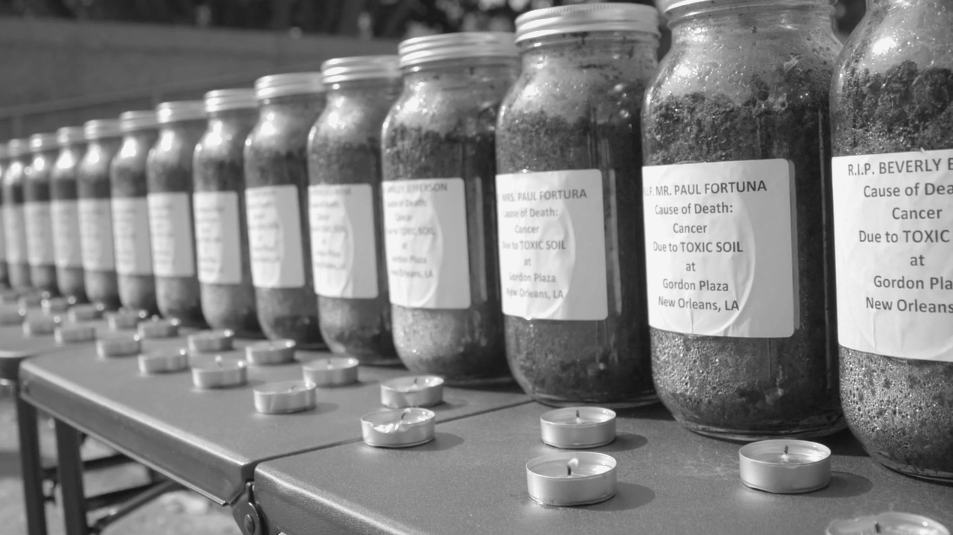RELOCATION IS THE ONLY OPTION
By Sanashihla
Around the world, people are dealing with the impacts of environmental injustice. Of course, Black and Brown communities deal with it more, because these are the communities most vulnerable to being targeted for oil and other corporate plants. What used to be known as the plantation, is now too often the corporate plant, which come with their toxicity.
Whether dealing with climate change, or blatant disregard for the earth and communities across the United States, we never have to go far to come up close and personal with environmental injustice.
Let us examine the daily experience of the residents of Gordon Plaza, who are entire community of predominately Black residents who were sold homes built on a TOXIC dump. Periodically, they have seen trash work its way up from the depths of the soil, up through their grass into their yards. Their soil was tested, and over 100 high level TOXINS were found.
What is the story of the residents of Gordon Plaza?
“Residents of Gordon Plaza, Inc. is a group of neighbors that purchased houses in good faith only to find out that our houses were constructed on top of hazardous waste. We are New Orleans families, African American, trapped in homes built on the Agriculture Street Dump, a former city waste dump that was designated a Superfund site for high levels of contamination, including hazardous waste that can cause cancer. We suffer and some have died from cancer. We want to relocate.
From 1967 through 1984, city land use decisions approved residential developments on the Agriculture Street Dump. These developments included the Gordon Plaza single-family homes where we currently live, the abandoned Press Park townhomes built by the Housing Authority of New Orleans (HANO), and the abandoned Robert Moton Elementary School built by the Orleans Parish School Board (OPSB). The fact that homes and a school were built on the Agriculture Street Dump was not a concern for city officials. Families who bought homes in Gordon Plaza were never told that the land was a former city waste dump. Again, our families are predominantly African American.
Beginning in 1999, the Environmental Protection Agency (EPA) dug up, piled, and hauled off a portion of the contaminated soil on the Agriculture Street Landfill Superfund Site, while our families still lived in our homes. Public health and environmental experts criticized the EPA for jeopardizing the health of residents and failing to provide an effective and humane solution. Although the EPA detected 17 feet of highly contaminated soil, the agency removed only two feet. Today, at least 15 feet of the contaminated soil remains beneath homes, yards, streets, and other areas of the former Agriculture Street Dump.
There was a class-action lawsuit that ended with a $14.2 million settlement award in which the lawyers and a court-appointed administrator were paid $7.1 million, one-half of the settlement award. The remaining half was distributed among the 5,053 people represented in the lawsuit, resulting in an average pay-out of less than $2,000. With a few thousand dollars, the families living in Gordon Plaza cannot relocate from this toxic neighborhood. We cannot purchase new homes, nor can we sell our current homes for what our homes would be worth if we were not on a toxic Superfund Site.”
The city of New Orleans is responsible for giving permission to developers to build these homes on the Agriculture Street Landfill, and now take no responsibility. THIS is an inhumane environmental injustice, Black Lives Matter, lack of equity issue. The New Orleans Peoples Assembly organizing committee stands with the residents of Gordon Plaza in their call for complete relocation.
This is a Complete Injustice
We Stand with the Residents of Gordon Plaza

